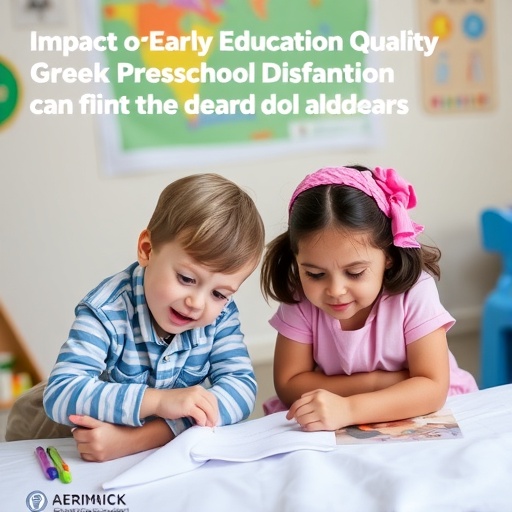In a groundbreaking study set to be published in the Early Childhood Education Journal in 2025, researchers K. Rentzou, E. Tsiara, and D. Barranco explore a critical yet often overlooked issue in the realm of early childhood education: the disaffection of Greek preschool children and the intricate relationship it holds with the quality of early childhood education and care (ECEC). This research comes at a pivotal time, as global education systems strive to adapt and improve in an era marked by swift societal changes and a continuous push for educational innovation.
Disaffection among preschoolers can manifest in various forms, including apathy, disengagement, and behavioral issues that hinder the learning process. The stakes are high in understanding this phenomenon, especially as educational institutions seek to foster environments conducive to learning and emotional development. The researchers’ aim is to shed light on the underlying factors contributing to disaffection, which could serve as a precursor to more significant issues later in a child’s educational journey.
The study comprehensively examines multiple dimensions of early childhood education and care, emphasizing the critical role of educators and the overall environment in shaping children’s attitudes toward learning. One of the fundamental aspects addressed is how the educational framework affects children’s emotional well-being. When children feel unsupported or unengaged in their early years, this lays the groundwork for future academic struggles and mental health challenges.
An essential component of this research is the methodology employed by Rentzou, Tsiara, and Barranco, which integrates both qualitative and quantitative measures. This dual approach allows for a holistic understanding of children’s disaffection. Surveys, interviews, and observational studies form a robust data set, offering insights not only into the children’s experiences but also into the perspectives of parents and educators. This multi-faceted approach ensures that the findings resonate with a broad audience, enhancing their applicability in real-world scenarios.
The researchers also delve into the notion of educator training and preparedness. They argue that the effectiveness of preschool educators significantly impacts emotional climate and children’s attachment to learning. Early childhood educators equipped with the right tools and training are more likely to create stimulating environments that foster emotional connections with their students. The implications of this aspect cannot be overstated as it underscores the need for policy reforms that prioritize comprehensive educator training.
Additionally, the study highlights the importance of family involvement in the educational process. It suggests that strong collaborative efforts between parents and educators can significantly contribute to reducing disaffection rates among preschool children. The research emphasizes how family dynamics and parental engagement play a vital role in shaping children’s attitudes toward school and learning.
The findings from this research possess the potential for significant social impact. Understanding the sources of disaffection in early childhood settings could inform new strategies for curriculum design that cater not only to academic learning but also to emotional and social development. As education systems worldwide face a myriad of challenges, this study provides pivotal insights that could lead to transformative approaches in early education.
Moreover, the implications of this research extend beyond the confines of Greece. Many countries grapple with similar challenges in their early childhood education frameworks. The adoption of findings from this study could encourage international discourse on enhancing educational quality and emotional support systems in preschool settings globally.
The importance of addressing disaffection in early childhood education also resonates with mental health professionals. Eliminating feelings of disengagement at a young age can pave the way for healthier emotional development and reduce long-term psychological issues. This connection between education and mental health is an important dialogue that must continue in both academic and community settings.
As we move forward, the need for further research on this topic remains evident. While the current study offers a wealth of information, the ongoing exploration of disaffection and its causes will help to illuminate additional factors that influence child development. The landscape of early childhood education is constantly changing, and continued research will be crucial for adapting educational practices to meet the needs of future generations.
In conclusion, the work of Rentzou, Tsiara, and Barranco stands as a vital contribution to the field of early childhood education. By highlighting the connection between disaffection and the quality of educational experiences, this research opens up new avenues for dialogue, reform, and enhancement of early education practices. As educators, policymakers, and communities strive to improve the quality of care and education for young children, the insights provided through this study will undoubtedly steer meaningful progress in fostering engaging and supportive learning environments.
As we anticipate the publication of this pivotal study, it is clear that the quest for improved early childhood education will benefit greatly from the insights it promises to offer. The relationship between emotional engagement and educational quality is not merely a theoretical point of discussion but a fundamental issue that deserves our immediate attention and concerted action.
Subject of Research: Disaffection in early childhood education among Greek preschool children
Article Title: Greek Preschool Children’s Disaffection and its Relation to the Quality of Early Childhood Education and Care
Article References:
Rentzou, K., Tsiara, E. & Barranco, D. Greek Preschool Children’s Disaffection and its Relation to the Quality of Early Childhood Education and Care.
Early Childhood Educ J (2025). https://doi.org/10.1007/s10643-025-02033-3
Image Credits: AI Generated
DOI: https://doi.org/10.1007/s10643-025-02033-3
Keywords: Disaffection, Early Childhood Education, Emotional Engagement, Quality of Education, Preschool Children.




